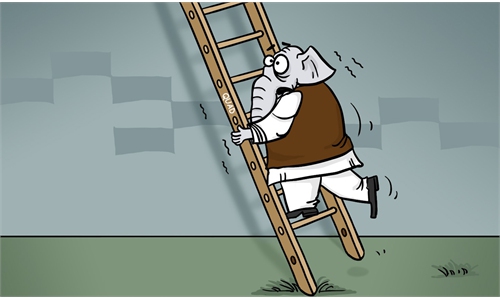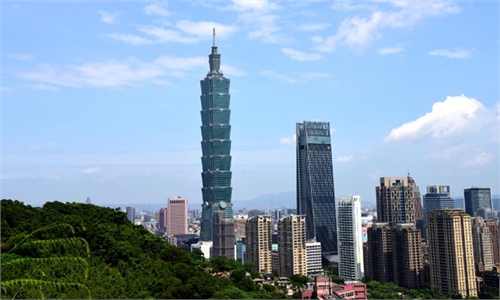COMMENTS / EXPERT ASSESSMENT
Air India privatization is no way to attack China’s macro policy

Illustration: Tang Tengfei/Global Times
The Indian government recently announced a plan to privatize the country's national carrier Air India. India's Tata Sons will pay $2.4 billion to buy a 100 percent stake in the struggling airline, according to a government statement. The move ends a decades-long struggle by the government to unload the money-losing venture.The acquisition has attracted wide attention from the West media outlets. Yet some media commentators have bizarrely made a connection between the acquisition and China's recent regulatory measures, by twisting the facts of the two cases to suit their own biased narrative.
India's move to privatize the debt-laden airline will boost the appeal of the nation's booming equity market just when China is intensifying its "crackdown on private firms," Bloomberg claimed.
Such absurd argument by Bloomberg is a clear attempt to smear China's recent regulatory measures, and try to instigate competition and rivalry between the two major Asian economies.
The privatization of Air India is the Indian government's decades-long struggle to offload the loss-making and indebted company. The recent regulatory measures in China are prompt and pragmatic actions to promote the formation of a fair and competitive market environment and better protect the rights and interests of consumers from the strategic perspective of standardizing market order and promoting high-quality economic development. The two cases are completely different in nature.
Given the New Delhi's deep-rooted protectionism in trade and a wide range of very discriminative taxation measures against foreign companies in its market, it's not realistic for India to reverse that image and significantly increase appeal to foreign companies and investors, only by selling stakes in one debt-laden state-run airline.
Instead of "crackdown on private firms," China has repeatedly vowed unchanged and firm support for the country's private sector. It is expected that China will continue to introduce supportive policies to promote the high-quality development of private enterprises. According to the 14th Five-Year Plan (2021-25), China will optimize the development environment, further relax market access, and create financial supportive tools to benefit growth of private enterprises.
Throughout the world, all economies have to properly address regulation of emerging industries. As new technologies constantly bring new businesses models, it's important to address policy loopholes.
Guarding against monopolistic oligarchies is not unique to China. What China has done is what other major developed economies in the world have done in terms of anti-monopoly practices.
In the face of increasing uncertainty and instability of the world economy, China has not tilted towards protectionism like India. The implementation of the Foreign Investment Law, the steady expansion of financial market access, and the construction of the Hainan Free Trade Port have all made the Chinese market increasingly attractive to foreign investors. In the first 7 months of this year, China's actual use of foreign capital hit 672.19 billion yuan ($104.35 billion), a year-on-year increase of 25.5 percent.
The results of the different economic policy choices of China and India are fully reflected in the gap of economic efficiency of the two countries. Effective control of the COVID-19, orderly resumption of work and production, and expansion of opening-up have made China the only economy in the global economy that achieved positive growth last year, with an increase of 2.3 percent.
Looking at Air India's track record of loss-making, thorny debt problems, and low stock price, its privatization is hardly a success story, and it should never be used to discredit China's macro policies, as well as its resilient economy.
The author is a reporter with the Global Times. bizopinion@globaltimes.com.cn



